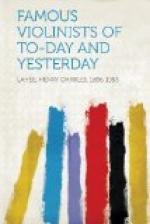Quartet playing in public was established in England in 1835, when the admirers of Joseph Dando, an excellent violinist, opened a subscription for the purpose of giving some concerts in which the chamber music, and especially the quartets of Haydn, Mozart, Beethoven, Spohr, etc., should be performed. The first concert was given at the Horn Tavern, Doctors’-Commons, in London, on September 23d of that year, and being highly successful, a second was given on October 12th, and a third on the 26th, each proving more attractive than its predecessor. These concerts lasted for two seasons, when a new quartet was formed, with H.G. Blagrove and Henry Gattie as first and second violins, Mr. Dando, viola, and Mr. Lucas, ’cello, for the more perfect study and presentation of quartets and other chamber music. These concerts were given at the Hanover Square rooms, and on account of the care bestowed upon the rehearsals (of which they held seven or eight for each concert), they threw all previous performances into the shade.
The tide of public favour had now set in, and other quartets were formed, but none reached such excellence as that headed by Blagrove, which was invited to play at the Philharmonic concerts, where it produced a great sensation.
About the end of the seventh season Blagrove withdrew, but the quartet continued in existence for many years, Mr. Dando playing first violin, and Mr. Loder, the viola, and the concerts were given at Crosby Hall in the city, instead of the Hanover Square rooms.
At St. Petersburg a quartet was formed by Leopold Auer, an excellent violinist, who at the death of Wieniawski was appointed professor of violin at the Conservatoire. Auer was born in Hungary, and became a pupil of Dont at Vienna, after which he had a brilliant career as a virtuoso in Europe. His St. Petersburg quartet was founded in 1868, and became one of the leading musical organisations of the Russian capital, until the death of Davidoff, the violoncellist, who was one of its members, in 1890.
Auer has been very active in the musical life of St. Petersburg, and is very highly esteemed both as a man and as a musician, teacher, and performer.
A quartet which has gained a great reputation in Europe during recent years is the Bohemian Quartet, consisting of Carl Hoffmann, first violin, Joseph Suk, second violin, Oscar Nedbal, viola, and Hanus Wihom, violoncello. They play with a great deal of vim and abandon, and the ensemble is remarkable.
At Hanover Richard Sahla has established a quartet, with Meneke, Kugler, and Loeleberg, and Arnold Rose’s quartet, of Vienna, has travelled in Hungary, Italy, and other countries, gaining a good reputation.
In the United States there have been well meant efforts to found good quartets, and these have all had a beneficial influence. In Boston Mr. Bernhard Listemann, some twenty years ago, established a quartet which gave some very delightful concerts, but the past decade has witnessed the rise of an organisation which is able to bear comparison with any quartet in the world.




